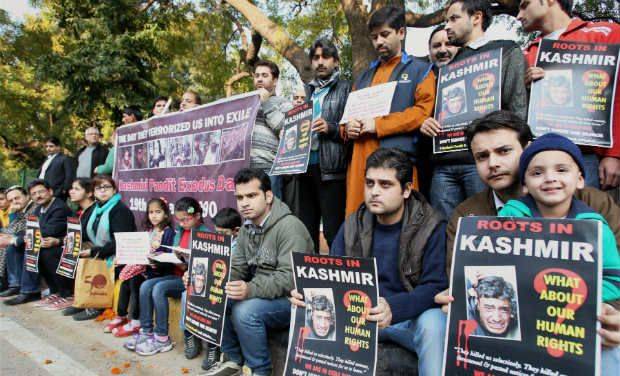And in my own way, I’ve followed his advice to the t. The dishes, my room and anything else that may be prone to collecting fungus remains in its unclean state. I once wore bikini bottoms to work because everything else was dirty. And since nobody’s ever won a Pulitzer for doing laundry, my life continues to rock hard this way.
My grandfather’s dead. He died of a broken heart and broken promises; promises that his sons and grandkids made about taking him back to his homeland. A broken heart because till his dying day, nobody had the guts or the inclination to take him back to a city that exiled and looted his kind. I can tell you that it wasn’t just him who was haunted by the ghosts of his homeland; it was all of them. They yearned to live out their remaining years in their ancestral homes in Srinagar, Kashmir. "Marav te shehjaras manz". "If we must die, let it be in respite, in Kashmir."
In 1990, my grandfather stopped reading and watching the news. “Ye chu soryee apuz, ye phand bazyee chus na be maanaan. Kashyr gaytz theek." ”These are all lies. I don’t buy this political propaganda. Kashmir will be fine."
He’d tell me, “Kashmiri Pandits have seen this before, we’ve been a persecuted sect for centuries. They’ll loot, force conversions, and eventually be thrown out. Kashmir has never been conquered before and it won’t be conquered now. Let’s go home, this will all end soon.”I do not know how tohonour his dying wish. We no longer have a home there, it was sold in distress. I could’ve taken his ashes to sprinkle in Srinagar last year, but his sons wouldn’t have any of it. How do I get them to agree to hold his death anniversary puja in the city that he wanted to die in, a city that they’ve grown bitter towards?
The Kashmiri Muslims have got it worse. Make peace with the fact that your father wasn’t killed and your aunts weren’t raped. That’s what I hear when the intellectuals on TV scream SEPARATISM FOR KASHMIR. Their plight is greater than yours because theirs continues. Dear Intellectual, who made you the accountant of my grandfather’s pain? Your left-liberal ways do not know what it feels like to see a loved one painfully wither away into nothingness. I felt his presence but his mind was always searching for his home. He loved me but his mental state didn’t allow him to register how many years had passed by – in his memory, I was still 5 years old. The adult version who he spoke to was someone he was fond of, but not the granddaughter who he bought yogurt for everyday in Srinagar. His inner distress would always find a way back into our reality; midway through his sermon on the space-time-continuum, he’d ask, “Koryee, ays kar gatczav gar vaapas?” Baby girl, when will we all go back? If you’re up for some basic math, that is him asking me, my cousins, his sons, their wives, and his wife the same damn question every waking hour for the past 25 years. How do you like them apples?
My pain is not greater than those suffering through the oppressive militarization in Kashmir. But neither does their pain trump mine. The half widows of Kashmir and I both wish for relief. I do not need to experience their struggles to empathize with them. They pray for the return of their husbands and I, for my grandfather’s soul to rest in peace. I crave for harmony but not a separate Kashmir. That city doesn’t just belong to the oppressed Muslims. Through the blood that runs in my veins, it is mine to lay claim to as well. But how do I lay claim to something I don’t feel safe enough to live in again?
I will never feel safe enough to live there until there’s an admission of wrong-doing. What happened in Kashmir was a classic case of majority-religion vs minority-religious politics. Like majorities everywhere, the Kashmiri Muslims felt like the rightful owners of the valley, and the Pandits clearly threatened their claim to sole ownership. Rebellion came hard and the religious fervor swept most of the majority with it. Then why is that fact obliterated from the predominant Kashmiri Muslim narrative? Their narrative starts and ends with the atrocities of the Indian military. But deep down, they know of their guilt. They know what they did.
They’re just too ashamed to admit it. I’ve met ex-militants in Srinagar who’ve told me stories of their reformation; I’ve heard tales of my father’s friends who were stopped by their families from joining the ‘cause'. The Kashmir insurgency was a classic case of mob mentality. Why is that reality absent from the Kashmir discourse? I will never feel safe enough to live in Srinagar until they acknowledge the fact that we were targeted. We can only work towards a compassionate cohabitation until the damages are addressed and the culpability acknowledged. In the memory of my grandfather and others who’ve suffered internal displacement at the hands of the Kashmir insurgency, I want an apology. Not because I don’t recognize the suffering of the Kashmiri Muslims, but because we suffered too. And my minority status does not make it any less important for the majority to admit to their shameful past. In order for Germany to move on from the horrors of the holocaust, they too had to admit to their collective guilt. Then why should the cleansing of my people from my homeland be treated any differently?
I lost my grandfather to the exile 25 years ago. I’ll be damned before I let his narrative be lost to it too.






